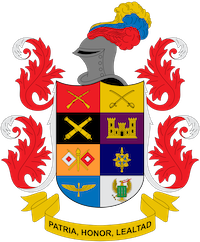Cultural intelligence as a tool for the Colombian Military Forces
Abstract
The fourth generation wars that the United States had to fight in Afghanistan and Iraq during the first decade of the 21st century highlighted a fundamental fact: asymmetric and irregular wars cannot be won without the support of the population. For this reason, psychological and civil-military actions form a fundamental part of the strategy in this type of conflict. However, without a cultural approach that allows understanding the social dynamics, these strategies cannot be successful. Hence the importance of incorporating the concept of cultural intelligence as a complementary process in the military intelligence cycle, which allows obtaining a strategic advantage in the face of the complexities of the socio-cultural environment. From this perspective, cultural intelligence is a useful tool for the context of the armed conflict in Colombia, which is characterized by a deep cultural fragmentation among the different regions of the country.
Downloads
References
Barrios, M. (2010). Apuntes sobre familia, comunicación y cambio social: reflexiones en torno a la obra de Virginia Gutiérrez de Pineda. Revista Folios, (24), 163-179.
Comando General de las Fuerzas Militares. (1997). Manual de estrategia militar operativa. Texto especial reservado. 2a. ed. Bogotá.
Comando General de las Fuerzas Militares. (2002). Inteligencia estratégica. Texto especial reservado. 3a. ed. Bogotá.
Depaula, P. y Saucedo, B. (2011). Globalización, cultura y desarrollo de inteligencia cultural en contextos militares: algunas aproximaciones teóricas. Recuperado de http://rediu.colegiomilitar.mil.ar/esp/ediciones/0822/articulos_originales/ReDiU_o822_art1-Globalizaci%-C3%B3n,%20Cultura%20y%20desarrollo%20de%20lnteligencia%20Cultural.pdf
Depaula, P. y Azzollini, S. (2012). Inteligencia cultural, valores y motivaciones para el aprendizaje de estudiantes militares argentinos. Revista de Psicología, 30(1), 75-102. Recuperado de http://www.scielo.org.pe/pdf/psico/v3on1/ao4v3on1.pdf https://doi.org/10.18800/psico.201201.004
Instituto Geográfico Agustín Codazzi. (2002). Regiones culturales de Colombia. Recuperado de http://www.zonu.com/fullsize/2011-08-26-14555/Regiones-culturales-de-Colombia-2002.html
Kottak, C. (2011). Antropología cultural. México: McGraw-Hill.
Patiño, C. (2010). Guerra y construcción de Estado en Colombia, 1810-2010. Bogotá: Editorial B.
Renzi, F. (2007). Redes: terreno desconocido y la inteligencia etnográfica. Military Review, 78-86. Recuperado de https://server16040.contentdm.oclc.org/cgi-bin/showfile.exe?CISOROOT=/p124201coll1&CISOPTR=881&filename=882.pdf
Reyes, M. (2009). Los Derechos Humanos y el Derecho Internacional Humanitario: Hoja de Ruta del Ejército Nacional. Bogotá: Sagita.
Rocha, F. y Otero, J. (2010). El factor cultural: una nueva estrategia impulsada por Estados Unidos en Afganistán. ARI, (22). Recuperado de http://www.realinstitutoelcano.org/wps/portal/rielcano/contenido?WCM_GLOBAL_CONTEXT=/elcano/elcano_es/zonas_es/lengua+y+-cultura/ari22-2010
Safford, F. y Palacios, M. (2002). Colombia: país fragmentado, sociedad dividida. Bogotá: Norma.
Scales, R. (2006). La segunda revolución del proceso de aprendizaje. Military Review, 47-56.
Wunderle, W. (2006). Through the lens of cultural awareness: a primer of US Forces deploying to Arab and middle eastern countries. Fort Leavenworth: Combat Studies lnstitute Press. Recuperado de http://usacac.army.mil/cac2/cgsc/carl/download/csipubs/wunderle.pdf













